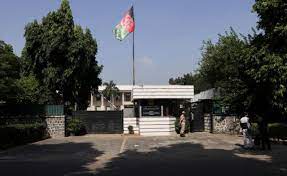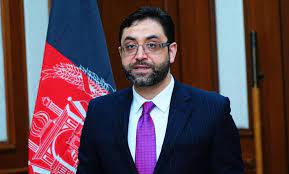New Delhi, October 1, 2023 – After months of uncertainty and growing diplomatic tensions, the Embassy of the Islamic Republic of Afghanistan in India has officially closed its doors. This decision was announced in a press statement shared with the media, citing various factors, including a lack of support from the “host government” and the challenges posed by the arrival of the Taliban administration in Kabul.
In the statement, the embassy expressed its deep regret over the closure of its operations, which included a reduction in personnel and resources due to the Taliban’s takeover in Kabul. The embassy acknowledged that it had failed to meet the expectations in serving Afghanistan’s interests, primarily due to the challenges posed by the new administration in Kabul and a notable absence of crucial support from the Indian government.
“The Embassy has experienced a notable absence of crucial support from the host government, which has hindered our ability to carry out our duties effectively,” the press statement from the mission stated. It further added, “Given these circumstances, it is with deep regret that we have taken the difficult decision to close all operations of the mission with the exception of emergency consular services to Afghan citizens until the transfer of the custodial authority of the mission to the host country.”
The statement also highlighted the deep divisions between the Taliban regime in Kabul and the former rulers of Afghanistan. It cautioned against anyone working for the present rulers of Kabul in Afghan consulates in Hyderabad and Mumbai. Unlike the embassy in Delhi, the Afghan consulates in these cities have not shut down, with Consul General of Afghanistan in Mumbai, Zakia Wardak, affirming their commitment to serving Afghan citizens requiring consular services in India.
The embassy strongly expressed its belief that actions taken by these consulates do not align with the objectives of a legitimate or elected government but rather serve the interests of an illegitimate regime. It emphasized that such activities conducted independently are contrary to established norms of diplomatic representation. This statement further underscored the earlier reports of division among the diplomatic staff within the embassy and the two consulates of Afghanistan.
Ambassador Farid Mamundzay, who left India more than three months ago and did not return, created a significant vacuum in the embassy. This situation was compounded by the departure of at least four other senior officials, including his personal secretary.
The Afghan embassy in New Delhi, located in the diplomatic enclave of Chanakyapuri, has witnessed the tumultuous political history of Afghanistan for decades. However, it was not operated by the Taliban since their rise to prominence in 1996.
India did not recognize the Taliban regime in Kabul after the fall of President Dr. Ashraf Ghani in 2021. Instead, India maintained a “technical team” in the Indian embassy in Kabul since June 2022. New Delhi has thus far not established formal diplomatic relations with the Taliban administration in Kabul, making the future of the embassy uncertain as it has historically belonged to the rulers of Kabul.
The mission said that the decision to shut down was taken in accordance with the Article 45 of the Vienna Convention on Diplomatic Relations, 1961, declaring that all property belonging to it will be transferred to the “custodial authority of the host country”.
The public statement from the mission urged the government of India to continue to fly the flag of the Islamic Republic of Afghanistan that was in existence between 2004 and 2021. Shutting of the mission in the absence of formal diplomatic ties with the Taliban has placed a question mark on the consular requirements of many Afghan students, traders and tourists who have been affected by the presence of the Taliban in Kabul.
Afghanistan at present has two weekly flights to Delhi that ferry Afghan citizens to India but sources in the Afghan embassy said, visa-related difficulties have forced the flights to be largely used for cargo purposes. Interestingly, the closure came hours after the Moscow format dialogue on Afghanistan was held in Kazan, Russia, where the Taliban participated in discussion with stakeholders that included India. Taliban had earlier urged India to help in establishing economic stability of Afghanistan.




